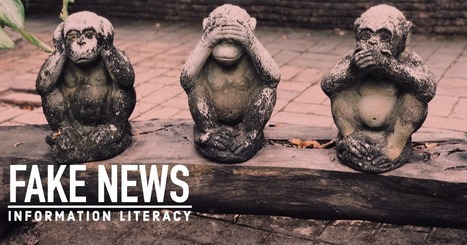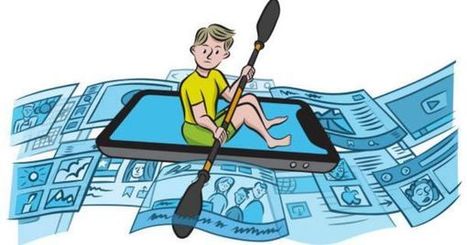 Your new post is loading...
 Your new post is loading...
The issue of Fake News in general isn’t likely to go away. Kalev Leetaru in Forbes sends us A Reminder That ‘Fake News’ Is An Information Literacy Problem – Not A Technology Problem
Beneath the spread of all “fake news,” misinformation, disinformation, digital falsehoods and foreign influence lies society’s failure to teach its citizenry information literacy: how to think critically about the deluge of information that confronts them in our modern digital age. Instead, society has prioritized speed over accuracy, sharing over reading, commenting over understanding. Children are taught to regurgitate what others tell them and to rely on digital assistants to curate the world rather than learn to navigate the informational landscape on their own.
Via John Evans
Dr. Alison Head and her Project Information Literacy (PIL) research team recently released the findings of a new national study on college students and how they consume and interact with a vast and deeply polarized news ecosystem. The News Study findings are the result of an online survey of 5,844 respondents and telephone interviews with 37 participants from 11 diverse colleges and universities. The research also included computational analysis of Twitter data associated with respondents, as well as a Twitter panel of 135,891 college-age people.
In the study’s press release, Dr. Head shared:
News is fast, social, and visual and typically delivered to students in posts, alerts, tweets, and conversations that stream at them throughout the day. And young news consumers are left to assemble and interpret what news means, while many take this evaluative step, others do not.
So what? The News Study’s Executive Summary offers Five Research Takeaways as well as Six Recommendations.
Via John Evans
We are in a mission-critical state of losing democracy unless we train a laser-beam focus on broadening our definition of what it means to be literate in our society. It is not difficult to create the standards and write the assessments we need to measure our students’ web literacy skills. Certainly, being able to validate between fact and fiction must become a basic tenet of teaching reading across all channels of information. The curriculum to support these skills cannot be limited to a special course or an orientation in the library. As with reading print, web literacy needs to be embedded across the curriculum and within the design of assignments across all grades and subjects. Students need practice, practice, practice.
Our national policy of filtering the web in our schools to protect children from objectionable material was an incomplete solution, and one that may backfire to produce an ill-informed and easily manipulated electorate. No one would argue that we must filter out highly objectionable material. However, the reality of life in a democracy is that the information flowing toward our citizens 24/7 across many digital channels is messy — even nasty — with multiple versions of the truth.
Via Sharrock
|
Beneath the spread of all “fake news,” misinformation, disinformation, digital falsehoods and foreign influence lies society’s failure to teach its citizenry information literacy: how to think critically about the deluge of information that confronts them in our modern digital age. Instead, society has prioritized speed over accuracy, sharing over reading, commenting over understanding. Children are taught to regurgitate what others tell them and to rely on digital assistants to curate the world rather than learn to navigate the informational landscape on their own. Schools no longer teach source triangulation, conflict arbitration, separating fact from opinion, citation chaining, conducting research or even the basic concept of verification and validation. In short, we’ve stopped teaching society how to think about information, leaving our citizenry adrift in the digital wilderness increasingly saturated with falsehoods without so much as a compass or map to help them find their way to safety. The solution is to teach the world's citizenry the basics of information literacy.
Via John Evans, Federico Santarelli
One of the problems I've had for a while with traditional digital literacy programs is that they tend to see digital literacy as a separable skill from domain knowledge. In the metaphor of most educators, there's a set of digital or information literacy skills, which is sort of like the factory process. And there's data,…
Via Elizabeth E Charles
|



 Your new post is loading...
Your new post is loading...













